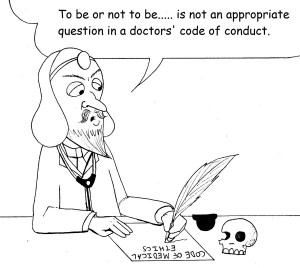Theater can bring awareness to health
In the words of the beloved Bard, “All the world’s a stage.” This statement applies even in the hospital room.
At a glance, theater and medicine seem like wholly different worlds, too contrasting to string into the same sentence. And yet, that same combination is making magic happen at the University of Missouri. And it shouldn’t stop there.
In a series of short plays called Breast Cancer Dialogues, MU is using theater to help doctors and nurses become more responsive to patients’ needs. Not only does the project open up discussion of breast cancer, but it also sheds light on the significance of the humanities in understanding the cultural, social and emotional aspects in medicine.
The series was developed by Heather Carver, an associate professor of playwriting and performance studies at the MU. After battling breast cancer in 2005, she came up with the idea of creating short plays that could, according to the Medical Daily, “somehow make the complexities behind doctor-patient rapport more real to medical students, in order to help train them for real-life situations.” The project incorporates interactive theater to allow the audience to intervene mid-scene, challenging and readjusting the script in a way that makes the doctor more caring toward the patient. The dialogue stems from real-life experiences.
Though the realm of science conjures up images of Frankenstein and test tubes, in the day-to-day duties of a healthcare professional, medicine is not just a science, but an art. The personal bond between patient and physician remains the essence of the profession.
In a paper published in the Journal of General Internal Medicine, Dr. Alan Dow, conducted a pilot study exploring the effects of using theater to teach clinical empathy. The researchers concluded that collaborative efforts of the departments of theater and medicine are indeed effective, further suggesting the promise of this interdisciplinary approach.
The connection between the stage and the hospital is very real. As the paper pointed out, “During patient encounters, expert clinicians perceive empathy cues from patient and compose verbal and nonverbal responses that are tailor-made to what they observe and hear. Similarly, actors on stage must identify the different vocal tones, body language and degree of emotion expressed by other actors. They then respond, in the moment, with a carefully measured reaction.”
Yet, by no means am I trying to make a blanket statement to say that the humanities and science are actually one area of study. In truth, they harbor many differences — science studies the natural world with a logical, critical eye whereas the humanities focus on the inner world of the self, perception and expression. However those differences are not meant to divide.
Let’s do away with this so-called split between the two titular cultures of science and humanities. Rather, theater and medicine are unified by the common goal of understanding the human condition — just in different ways. They need each other.
As Samuel H. Golter, founder of City of Hope National Medical Center, once said, “There is no profit in curing the body, if in the process, we destroy the soul.” In other words, a cure is nothing without compassion, a central lesson in the Breast Cancer Dialogues. MU isn’t the first to merge medicine with theater, and it shouldn’t be the last.
Valerie Yu is a sophomore majoring in biological sciences and English. Her column “Heart of the Matter” runs Mondays.
Follow us on Twitter @dailytrojan

